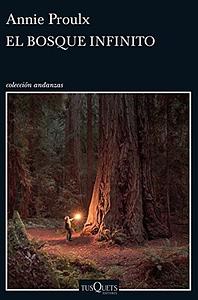You need to sign in or sign up before continuing.
Take a photo of a barcode or cover
Did not follow consistent cast of characters
"Men behave as overlords. They decide what will flourish and what will die. "
In the years 1693-2013, Proulx explores the human motivations and barriers among numerous generations of two families, followed by the devastating consequences to the earth's forests. This is a call to arms for readers who value Earth Day concerns, like to follow the paths of the very rich, immigrants, and especially the many wrongs done to First Nations people.
With nods to major events in history such as historic fires, the Great Depression, wars and more, this draws a clear picture of how the United States and Canada developed from the first years when white people landed on their shores. Proulx captures the fascination with easy wealth, unscrupulous bosses, frequent accidental death, foreign influx of disease even as two convictions are repeated throughout history, i.e., that Indians are useless and lazy (inferior) , and that forests are indestructible (endless).
With glimpses into how earth destruction is universal (New Zealand, Brazil, Germany), Proulx examines the motivations of greed and social esteem while also noting that the inability to receive educations hindered others from pursuing decent livelihoods. This honors the old ways of the First Nations people, draws almost scientific conclusions about how trees knit together ecosystems, and ends on a note of hope that is hampered by the sins that have prevailed for hundreds of years.
This is stellar writing that perhaps could have left out a generation or two, but like that the conclusion is this current decade, emphasizing that attention is needed. This is thought-provoking and disturbing. An excellent read-alike for this is The Overstory by Richard Powers.
In the years 1693-2013, Proulx explores the human motivations and barriers among numerous generations of two families, followed by the devastating consequences to the earth's forests. This is a call to arms for readers who value Earth Day concerns, like to follow the paths of the very rich, immigrants, and especially the many wrongs done to First Nations people.
With nods to major events in history such as historic fires, the Great Depression, wars and more, this draws a clear picture of how the United States and Canada developed from the first years when white people landed on their shores. Proulx captures the fascination with easy wealth, unscrupulous bosses, frequent accidental death, foreign influx of disease even as two convictions are repeated throughout history, i.e., that Indians are useless and lazy (inferior) , and that forests are indestructible (endless).
With glimpses into how earth destruction is universal (New Zealand, Brazil, Germany), Proulx examines the motivations of greed and social esteem while also noting that the inability to receive educations hindered others from pursuing decent livelihoods. This honors the old ways of the First Nations people, draws almost scientific conclusions about how trees knit together ecosystems, and ends on a note of hope that is hampered by the sins that have prevailed for hundreds of years.
This is stellar writing that perhaps could have left out a generation or two, but like that the conclusion is this current decade, emphasizing that attention is needed. This is thought-provoking and disturbing. An excellent read-alike for this is The Overstory by Richard Powers.
Like if James A. Michener wrote a novel about logging, only I daresay Proulx is a much better storyteller than he was. :)
People flit in and out of this novel quickly - it covers about 400 years in history of two families - so it's hard to get attached to any one character. And when they die, they die suddenly - you spend 5o or so pages with a character and then they're gone in a sudden sentence. But a few stand-out characters (Lavinia Duke, for one, a fierce woman who runs the family logging business in the mid-19th century) help move the book along.
The themes of the novel are what makes it important: Destroying nature and trying to restore, how little we really know about the complexity of forests, stealing Native American land, capitalism vs environmentalism, and just the general currents of history.
A fascinating story, well told.
People flit in and out of this novel quickly - it covers about 400 years in history of two families - so it's hard to get attached to any one character. And when they die, they die suddenly - you spend 5o or so pages with a character and then they're gone in a sudden sentence. But a few stand-out characters (Lavinia Duke, for one, a fierce woman who runs the family logging business in the mid-19th century) help move the book along.
The themes of the novel are what makes it important: Destroying nature and trying to restore, how little we really know about the complexity of forests, stealing Native American land, capitalism vs environmentalism, and just the general currents of history.
A fascinating story, well told.
I finally, finally finished this 713 page book! Annie Proulx is such a great writer. I have loved everything if hers I have read because of her descriptive language and precision with words. Also, I love a book with a family tree in the back. This epic multi-generation, multi-family North American tale is an amazing work of eco-fiction. The story begins is 1693 when two indentured servants from France, Charles Duquet and Rene Sel arrive in New France, later known as Nova Scotia to work on the property of landed Frenchman Claude Trepagny. After 3 years, they would gain their own land and freedom. Almost immediately, we are introduced to the supporting background character of the whole book— the North American Borial Forest. How the newcomers see it, the forest is an unending resource for cutting and selling lumber. The story follows the Dukes (they anglicized the name) and the Sels from the 1690’s to 2013 and their relationship to the forest. The Dukes progress in time as logging barons and the Sels as indigenous Mi’kmaw ripped from their lands.
Even though this might be one of the longest books I’ve read, I found it easy to fall into the story each time I opened the book. Proulx’s writing just puts you in the story easily, and she uses short, well organized chapters. The book ends and you feel as if the story will go on even as you close the pages. She is able to tell intricate tales of the family members and also seamlessly fold time forward to advance the story. She did this same thing in The Accordion Crimes, which I also loved.
As an eco-fiction book, it tackles its subject of deforestation with devastating accuracy. It shows how personal greed, individual decisions, racism against native peoples, and economic forces all have a role in destruction. By the same token, throughout, there are countervailing voices trying to get back to the balance the forests provide, even and especially on the Sel side in the modern time period.
If you have the time and the inclination, I highly recommend this book. 4 stars only because it took me so long to read it.
Even though this might be one of the longest books I’ve read, I found it easy to fall into the story each time I opened the book. Proulx’s writing just puts you in the story easily, and she uses short, well organized chapters. The book ends and you feel as if the story will go on even as you close the pages. She is able to tell intricate tales of the family members and also seamlessly fold time forward to advance the story. She did this same thing in The Accordion Crimes, which I also loved.
As an eco-fiction book, it tackles its subject of deforestation with devastating accuracy. It shows how personal greed, individual decisions, racism against native peoples, and economic forces all have a role in destruction. By the same token, throughout, there are countervailing voices trying to get back to the balance the forests provide, even and especially on the Sel side in the modern time period.
If you have the time and the inclination, I highly recommend this book. 4 stars only because it took me so long to read it.
This sat on my shelf for years - I thought it was important, but not a book to love. Wrong! For one thing, it's a propulsive read, divided into 10 novella-sized sections with fairly short chapters that have lots of page breaks; I never felt like I was reading a 'tome' and I always couldn't wait to get to the next section. Covering 400 years and about 10 generations (of humans, many more generations of trees), characters come and go, but I felt engaged with all of them, although Beatrix, Posey and Jinot were especially unforgettable for me. Posey could have been one of Dicken's best creations ;) But this book is more than just a great intergenerational story - it is an environmental novel that will break your heart, telling the story of the European invasion of North America and the destruction of ancient cultures, forests and whole ecosystems through the eyes of individuals living the experience. If you're going to read one environmental novel, this is the one to pick. [b:The Overstory|40180098|The Overstory|Richard Powers|https://i.gr-assets.com/images/S/compressed.photo.goodreads.com/books/1562786502l/40180098._SY75_.jpg|57662223] is newer and has gotten a lot of attention, but it doesn't have the heart and heft of Barkskins.
Barkskins is an epic saga of 300 years in the lives of two families descended from early French migrants to North America. Over the years we read not just about the varied characters and their fortunes, but also a history of capitalism, the forest industry, and attempted environmental and cultural annihilation. At times the dialogue feels too expository, needed to fill in the historical details for those of us who don't remember learning these events in high school, but most of the book flows beautifully so it was hard to put it down between chapters.
Half the book focuses on one line of Mi'kmaw descendants, clearly showing how the effects of colonialism have persisted and compounded through centuries, while also showing Indigenous attempts to resist and adapt in various ways. In the acknowledgments Proulx thanks the Mi'kmaw historians and others who helped her with her research on this, but as she is not herself Indigenous (and neither am I), it's possible her attempts may be read as more or less successful by someone with actual Mi'kmaw heritage. Importantly, there is a thread throughout the book that preservation and recovery of our environment can and should be led by Indigenous people, around the world, with former colonizers respecting their knowledge.
Barkskins is not a dense book but it is a heavy book that forces us to confront our history and our potential future extinction if things continue as they are.
Half the book focuses on one line of Mi'kmaw descendants, clearly showing how the effects of colonialism have persisted and compounded through centuries, while also showing Indigenous attempts to resist and adapt in various ways. In the acknowledgments Proulx thanks the Mi'kmaw historians and others who helped her with her research on this, but as she is not herself Indigenous (and neither am I), it's possible her attempts may be read as more or less successful by someone with actual Mi'kmaw heritage. Importantly, there is a thread throughout the book that preservation and recovery of our environment can and should be led by Indigenous people, around the world, with former colonizers respecting their knowledge.
Barkskins is not a dense book but it is a heavy book that forces us to confront our history and our potential future extinction if things continue as they are.
I did this one over audio book; not sure I would have gotten through it otherwise. It was hard to follow the timeline in parts but the overall arching story was interesting and gave an enlightening perspective to the 400 years of history of Canada through its resources.
adventurous
emotional
funny
hopeful
reflective
sad
slow-paced
Plot or Character Driven:
Character
Strong character development:
Yes
Loveable characters:
No
Diverse cast of characters:
Yes
Flaws of characters a main focus:
Complicated
Captivating read
Enjoyed the lineage and tree talk! Makes me think about our inherent desire to over consume. Ending was a bit abrupt for me, but still enjoyable.
Enjoyed the lineage and tree talk! Makes me think about our inherent desire to over consume. Ending was a bit abrupt for me, but still enjoyable.
Great start. Little did I know this was one of those sweeping multigenerational books, which is a kind of book I can’t stand, so I gave up halfway through. I also feel a little weird when I read a deep-dive native perspective written by a white person.






